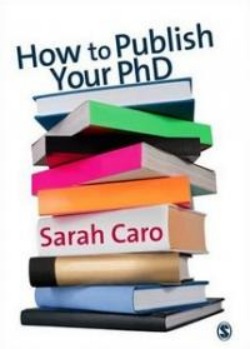 As a PhD student puzzled and disorientated by the seemingly impenetrable complexity of academic publishing, reading How to Publish your PhD by Sarah Caro was a balm for my anxieties. At present, I find myself occupying a point on the winding and erratic road to doctoral submission at which I am grateful (sometimes pathetically so) for advice, any advice, about demystifying academia. Having read several books on thesis writing early in my doctoral research, I had yet to discover a book that convincingly dealt with the practicalities of publishing a book from one’s thesis. In this ‘publish or perish’ world, it is really never to early to begin thinking about ‘the m word’. Monograph. Even reading the word itself gives me the willies.
As a PhD student puzzled and disorientated by the seemingly impenetrable complexity of academic publishing, reading How to Publish your PhD by Sarah Caro was a balm for my anxieties. At present, I find myself occupying a point on the winding and erratic road to doctoral submission at which I am grateful (sometimes pathetically so) for advice, any advice, about demystifying academia. Having read several books on thesis writing early in my doctoral research, I had yet to discover a book that convincingly dealt with the practicalities of publishing a book from one’s thesis. In this ‘publish or perish’ world, it is really never to early to begin thinking about ‘the m word’. Monograph. Even reading the word itself gives me the willies.
This thin volume (a sprightly 136 pages) is packed with valuable material for the angst-ridden PhD student with no idea of where to start, or the confused early career academic staring down the barrel of their first monograph. Filled with sensible advice and divided into self-evidently useful chapters such as ‘Books or Articles?’ and ‘Revising your PhD’, Caro has created a text to be read, re-read and referred to when needed. Every chapter is summarised in point form, making quick checks exceedingly simple. As the current Publisher for Economics and Management journals at Wiley and obvious veteran of the publishing world, Caro is ideally suited to be the author of such a book.
The text provides the reader with a series of things that a would-be creator of an academic monograph can do to help themselves, with particular focus on small and yet oft-overlooked details. Attentiveness to these details, according to Caro, can mean the difference between a submission ending up in the ‘no’ pile or the ‘maybe’ pile (p. vi). To say that Caro has thought of everything in this book would naturally be an exaggeration, but it is definitely fair to say that the book contains all of the major aspects of importance to the author. Given that these points are based on years of experience, I am inclined to believe that they are significant. Read more








